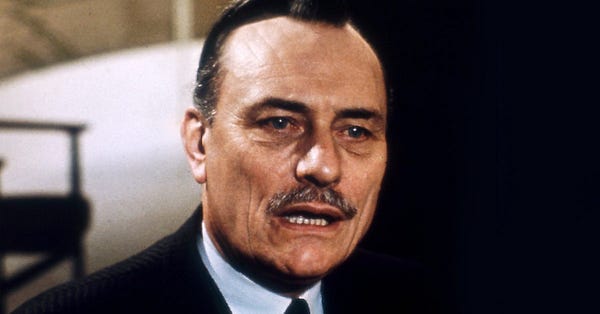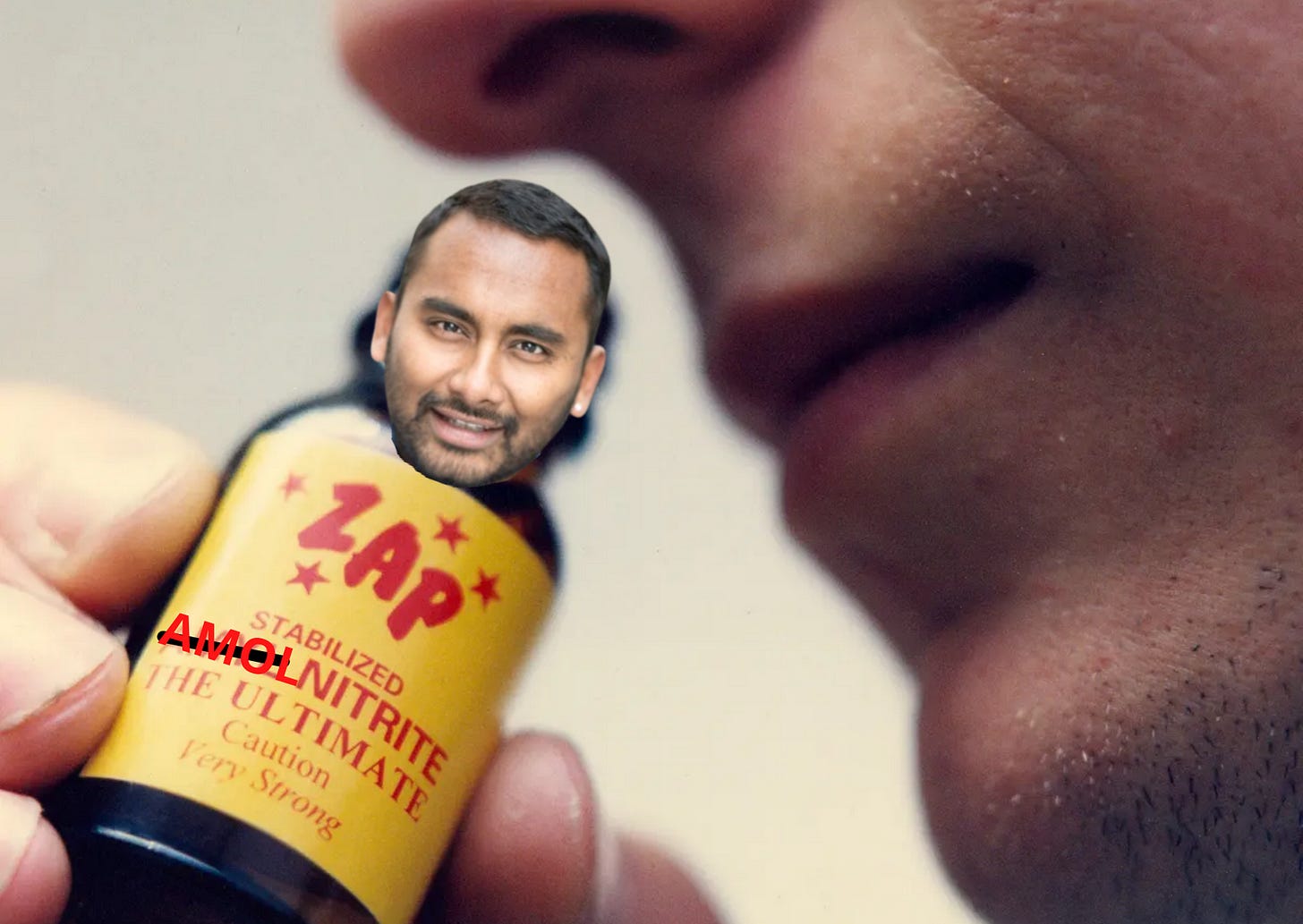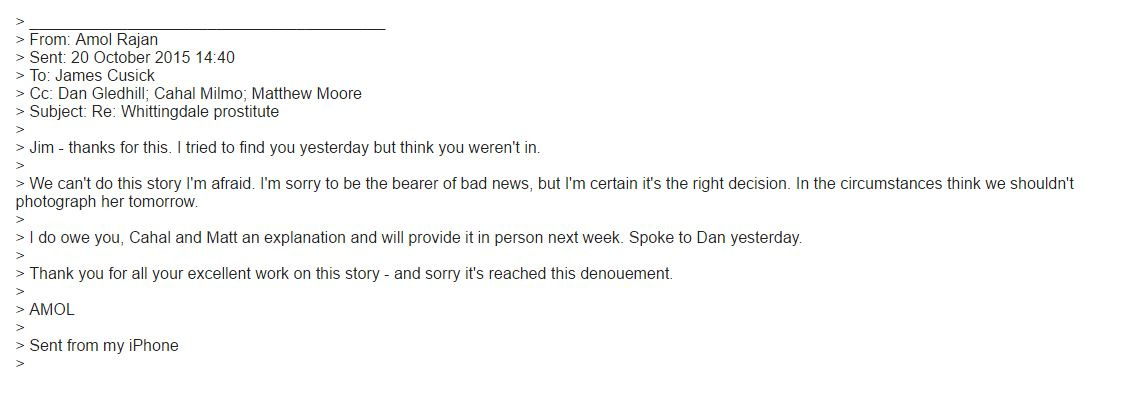Amol Nitrate: Why the BBC is so high on Amol Rajan's client journalism
The rise and rise of Rajan continues as he's given a plum spot at the Today programme and a primetime interview series
The rise and rise of Amol Rajan through the British media has been remarkable. In 2003, he was a researcher and (self-described) ‘mic boy’ on Channel 5’s daytime TV bearpit The Wright Stuff. By 2013, he was editor of The Independent. He helped usher that paper’s print edition into an untimely grave in 2016 and was made the BBC’s first Media Editor in November of the same year.
Now, after popping up all over the BBC in the years since — sitting in on The One Show and various Radio 2 shows as well as presenting The Media Show and documentary series, including a notorious one on Enoch Powell — Rajan has been appointed as the fifth member of the Today programme’s presenting roster. He will be the youngest of the current line up at just 37.
Rajan will remain Media Editor, continue to act as a stand-in for Radio 2 presenters including Zoe Ball and Jeremy Vine, and present “a major new BBC Two interview series and a two-part documentary series on the royals”.


When he was made Independent editor, Joseph Harker wrote of Rajan in
The Guardian:
British newspapers have traditionally been run by home counties, public school, Oxbridge-educated, men. Rajan is himself a Cambridge graduate, and has been a member of Independent owner Evgeny Lebedev's inner circle for several years. So it's likely Lebedev considered him a safe pair of hands – despite him being only 29 years old.
At the time of his elevation to The Independent’s top editorial job, Rajan was in charge of the paper’s comment section, Independent Voices, and Harker noted:
Rajan's Independent Voices section lists five ethnic-minority columnists of its total 45. That's not many – though it's an improvement on three years ago, when 40 of its 41 columnists were white. (At the Telegraph, by the way, all 31 listed columnists are white; at the Times 20 of 21 are white, and at the Guardian and Observer, 18 of its 20 listed columnists are white.) …
Stories that should be covered are not… with the prejudices of the cliques in control of the media – which go beyond race to class and gender too – held up as informed commentary.
I don't know if Rajan will do this – he is, after all, a former columnist for the notorious rightwing journal The Salisbury Review.

Rajan was a contributor and columnist for, as Harker accurately described it, “the notoriously rightwing” Salisbury Review while he was a reporter at The Independent.
In an Independent piece published in 2012, Rajan wrote of the magazine:
The Salisbury Review still publishes writing on politics, history and culture that is among the finest produced in English today. It is frequently offensive and I cannot say I often agree with its editorial position, but that is all the more reason to read it.
That’s a classic example of journalistic arse covering, both praising his friends at the Salisbury Review while distancing himself from anything objectionable that he just happened to be published alongside. In 2020, when Roger Scruton — who edited and published The Salisbury Review for 18 years — died, Rajan said “we all owe Roger Scruton a debt,” and published the following Twitter thread:





That’s Rajan’s schtick to a tee — insider chumminess larded with obvious literary references and a heavy-handed suggestion that he is rigorously rational. And beneath that sheen of pseudo-rationality, there pulsates an enormous ego. At age 18, before he went up to Downing College, Cambridge, Rajan worked for a year at the Foreign Office. During an edition of Question Time from 22 January 2015, Rajan comments off-handedly, “I used to be a diplomat.”
I worked at a farm shop when I was 14 so by that logic I used to be a farmer and when I moved on at 16 to the job of usher at Norwich Theatre Royal, I became a theatrical impresario.




Rajan and I were at Cambridge at the same time and contributed to the same student newspaper, Varsity, but I never met him and didn’t realise he was a columnist for that paper until I was looking through old digital copies a few years ago on the hunt for an indifferent review of a show I wrote.
As well as being a Varsity columnist (and briefly a contributor to Spiked), Rajan edited the paper for a term in 2005, the year he graduated. He pops up in a Guardian piece from that year written by another former Independent editor, Rosie Boycott. She wrote:
… Amol Rajan, 22, a third-year English student from Downing College and editor of Varsity magazine, said: 'Politicians use fear to try and make people engage; fear of terrorism and immigrants. They don't engage with domestic politics.' One thing that totally shocks Amol is that there are more black people in prison than in higher education. He will vote Lib Dem but wishes there was a box on the paper which said that he didn't want to vote for anyone. 'I would like to see three major parties. Two-party politics polarises debate. Parties define themselves by what they are not.'
In that article, Boycott was visiting her daughter, Daisy Leitch, who was and is friends with Rajan (you can see them pictured together in this photo from the 2018 GQ Hay Festival dinner).
Amol Rajan’s stint at The Wright Stuff ran until 2007 when he joined The Independent bouncing from news reporter to sports correspondent, columnist, comment editor, and editor of Independent Voices before he was made Editor. During that time he became increasingly close to Evgeny Lebedev and even acted as an advisor to the Russian on media matter for two years. A Guardian news piece, published when Rajan was promoted to Independent editor, noted:
He was a media adviser [to Lebedev] for two years, helping reshape Lebedev's reputation from relative unknown to becoming one of Fleet Street's more vocal newspaper owners. Under Rajan's stewardship, Lebedev gave a number of personal interviews to the press and spoke out regularly in the debate around Lord Justice Leveson's proposals for industry reform.
Delivering the 2018 Bob Friend Lecture to University of Kent at Canterbury, Rajan claimed he made a column the title’s most-read story of the month simply by tweaking a headline to juice the number of clicks it got:
“I know too well how chasing clicks, not least through tweaking SEO [search engine optimisation], distorts editorial priorities.
“At the end of my first week on The Independent website, I once had just one article left to publish. I was desperately short of numbers on the traffic front, and it would have spoilt my weekend if I didn’t hit my target.
Alas the only piece I had left to publish was by Andreas Whittam Smith, the founding editor of the paper.
He was a great journalist but not a big mover of traffic and this piece was about the need for greater transparency in the House of Lords and civil service – not the sort of salacious, traffic-generating subject you’d see in the Mail’s ‘Sidebar of Shame’.
Desperate for traffic, I looked at what was at the top of Google News. I saw that One Direction had just released an album in Canada. So I put a headline on Andreas’s piece that said: ‘All the evidence points in one direction: we need reform of our institutions now’.
It was the most-read piece on independent.co.uk that month. I love the idea of all these teenage girls in Canada looking up the latest song by Harry Styles and Zayn Malik, and instead coming across an essay by the founder of The Independent on restructuring the Treasury… Suffice to say, tweaking headlines in this fashion ain’t what I went into journalism to do.”
When BuzzFeed accused Rajan of pushing fake news in a lecture on… fake news, he put out a spoiler statement after being asked for comment. Then BuzzFeed UK editor tweeted:
Wow. I mean, it’s hardly Russian spies but, in general, when you approach a BBC employee for a comment on a story, you’d expect them not to tweet it out before we publish it… The point is – and I’m not claiming this is Watergate but it happened to Sam Coates [then of The Times] last week on something much more important – that it disincentivises journalists to check with subjects of stories before publication. And that’s bad for everyone.
The Independent also issued a response that charitably said that Rajan must have “misremembered” the tale and noted that the column in question had been the 1,460th most-read piece of the month in question.


As the BBC Media Editor, Rajan has broken a number of ‘scoops’ that might more accurately be described as ‘receiving a phone call and writing what you are told down before tweeting it out’.
He broke the story that his old boss (and friend) Lebedev had hired George Osborne as the new editor of The Evening Standard in March 2017 and — try to look shocked — also ‘broke the story’ that Lebedev had replaced Osborne with Emily Sheffield, David Cameron’s sister-in-law, in June 2020.
Another similar ‘scoop’ was Rajan’s recent revelation that Dan Wootton was off to GB News. As with the Evening Standard ‘scoops’, Rajan’s breathlessly tweeted details screamed of a quick phone call from the subject of the story.
In 2018, Rajan presented a radio documentary/discussion about a fellow Salisbury Review contributor, Enoch Powell, and his infamous ‘Rivers of Blood’ speech. The show provoked a significant amount of pre-broadcast press and uproar after Rajan’s promotional tweets — again in that breathless style — said that it would be the “1st time EVER” that the racist speech would be read in UK radio. It was tactless phrasing that might have suited the discovery of a long lost Dr Who episode but not the racist rantings of a long-dead politician.


That the producers had chosen Emperor Palpatine to voice the speech would have been a nicely on-the-nose choice were it not for the fact that Ian McDiarmid — who had played Powell onstage in Birmingham the year before — told The Telegraph that the politician was right on immigration and not a racist:
Does McDiarmid believe that Powell was, in fact, right in any sense? “I suppose in terms of the numbers he was. For him, it was all about numbers. I think everyone accepts now that it [immigration] can’t go on in an unlimited way because the results, as he said, would be catastrophic…”
And was he a racist? “I no longer think so. He was certainly stirring things up in a way [with the Rivers of Blood speech], which we would now describe as incitement because of the impact of its language. He was surprised by that impact, but he wasn’t totally naive about it. He wanted to make his mark and knew how to speak to an England that was as divided then as it is now.”
That sweet hit of syrupy controversy wasn’t enough for Rajan. This year, in a piece about his annual award for good writing which he set up and judges alone (see a previous newsletter for more on this solipsistic endeavour), he wrote:
It is an interesting fact about rhetoric that if you want people to understand something, plain, monosyllabic words are usually your best bet: "Ask not what your country can do for you; ask what you can do for your country".
Or think of the final line from Enoch Powell's most notorious speech: "All I know is that to see, and not to speak, would be the great betrayal."
I'm not endorsing the argument; but the rhetorical power of that line comes from the fact that there are 16 words, the first 15 of which have one syllable, the last of which has three.
Rajan is perfectly happy to strip words of their context and revel in their style, just as he’s willing to cosy up to power for power’s sake. He’s the man who gave Nigel Farage a column in The Independent and, just this week, managed to give GB News what amounted to a free advert on the BBC. He revels in the gossip and in-group knowledge of journalism and is handsomely rewarded for it.
In November 2019, former BBC reporter John Sweeney1 published the text of a letter to Ofcom on his website. In it, he accuses Rajan, among other BBC News journalists of being compromised:
Sarah Sands, editor of the Today programme and Amol Rajan, BBC Media Editor, receiving benefits in kind from their former employer, Russian oligarch Evgeny Lebedev. They attended parties thrown by Lebedev in his Italian palazzo. A third guest was Boris Johnson, now prime minister.
It seems impossible for any reporter on the Today programme to fully investigate widely reported stories that as Foreign Secretary Mr Johnson was seen as a “security risk” because of his attendance at Mr Lebedev’s parties if their editor was also a beneficiary of Mr Lebedev’s generosity. Amol Rajan as BBC Media Editor has reported on Mr Lebedev’s business affairs and he too has been a beneficiary of the oligarch’s generosity.
Neither the BBC nor Rajan responded to Sweeney’s claims.
In 2015, the former chair of the Department of Culture, Media & Sport select committee, John Whittingdale was elevated to the post of Culture Secretary. Between 2013 and 2014, Whittingdale had a relationship with a woman who worked as a professional dominatrix.
So what, right? That’s his business. But several newspaper groups were aware of the relationship, sat on the story, and then curiously Whittingdale made a series of policy decisions that were the stuff of Rupert Murdoch’s wet dreams. They included frequent attacks on BBC independence, blocking legislation that had been recommended by the Leveson Inquiry into the press, and bigging up the industry’s toothless and useless regulator IPSO.
James Cusick who worked as a reporter on The Independent wrote for Byline Times about the process of investigating Whittingdale and how Rajan ultimately spiked the piece after months of work:
During a five-month investigation at The Independent [in 2015], it was discovered that several newspapers had got wind of Whittingdale’s relationship with a dominatrix called Olivia King…
Cusick explains how The People then The Sun then The Mail on Sunday all dropped the story in turn after each had begun investigations of various levels of seriousness. His story continued:
Over the next few days, some Mail on Sunday journalists claimed Greig had been told to back off by Associated Newspapers’ editor-in-chief, Paul Dacre. Others said Dacre didn’t need to lay down the law, that what he wanted was embedded in the DNA of the Mail Group. Another said Greig was simply told to drop the Whittingdale investigation by an executive higher up the Associated Newspapers chain.
Two years on, nothing critical has been published on Whittingdale’s private life in any Mail title. When The Independent’s editor, Amol Rajan, made a similarly abrupt halt to his paper’s own Whittingdale investigation, he too offered no explanation. It was left to a senior editor at The Independent to say: “We’ve got no choice. We can’t take an asset away from the Mail.
Expanding on the events around that decision, Cusick recounted:
To complete a required legal element of the story before publication, it was important Olivia King be given the opportunity to respond. On October 19 last year “Mistress Kate” was scheduled to work at the London Retreat. Permission was sought from the editor to go the club and speak to her. The same day Amol Rajan was speaking at a Society of Editors conference. John Whittingdale was speaking at the same event just before him.
The next day, Rajan sent the following email:
The promised explanation never arrived.
Rajan has made himself a creature of the establishment, whether it’s making himself an indispensable friend to Lebedev or positioning himself as the BBC’s utility player — ready and willing to fill in on any show at any time.
Of course, Rajan’s tweet announcing the Today promotion was garlanded with praise from across the media. His true skill is not in presentation or story chasing, it’s in glad-handing and schmoozing. He only plays at ‘speaking truth to power’ as the smug journalist’s mantra goes because what he actually craves and chases is proximity to power.
In 2019, while sitting in for Jeremy Vine, Rajan came face-to-face with a journalist who has consistently shown himself willing to stand against his proprietor’s line — Peter Oborne. He nailed Rajan in a single sentence: “You, when you were Independent editor, notoriously sucked up to power; you were a client journalist yourself…” The Today programme is a reward for that.
Sweeney left the BBC after it decided not to broadcast his investigation on Tommy Robinson, which had a troubled production. He was also allegedly the subject of an HR complaint from a younger colleague who claimed he made an “offensive comment”.


